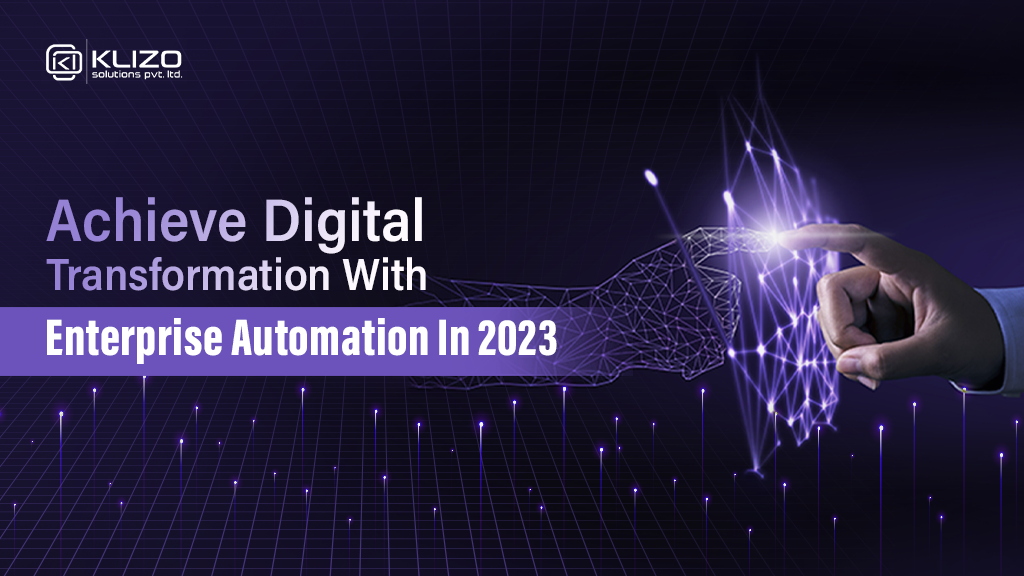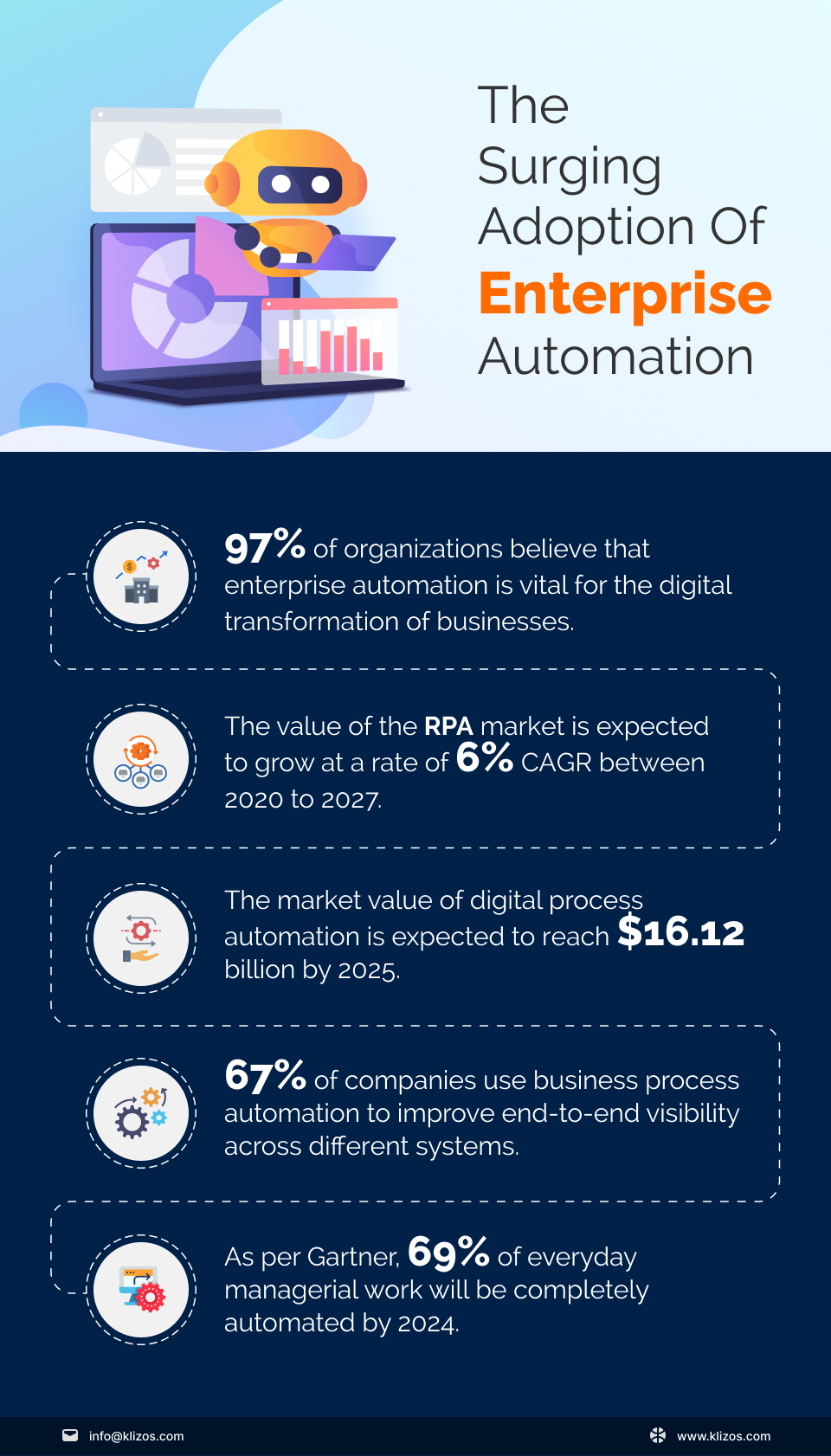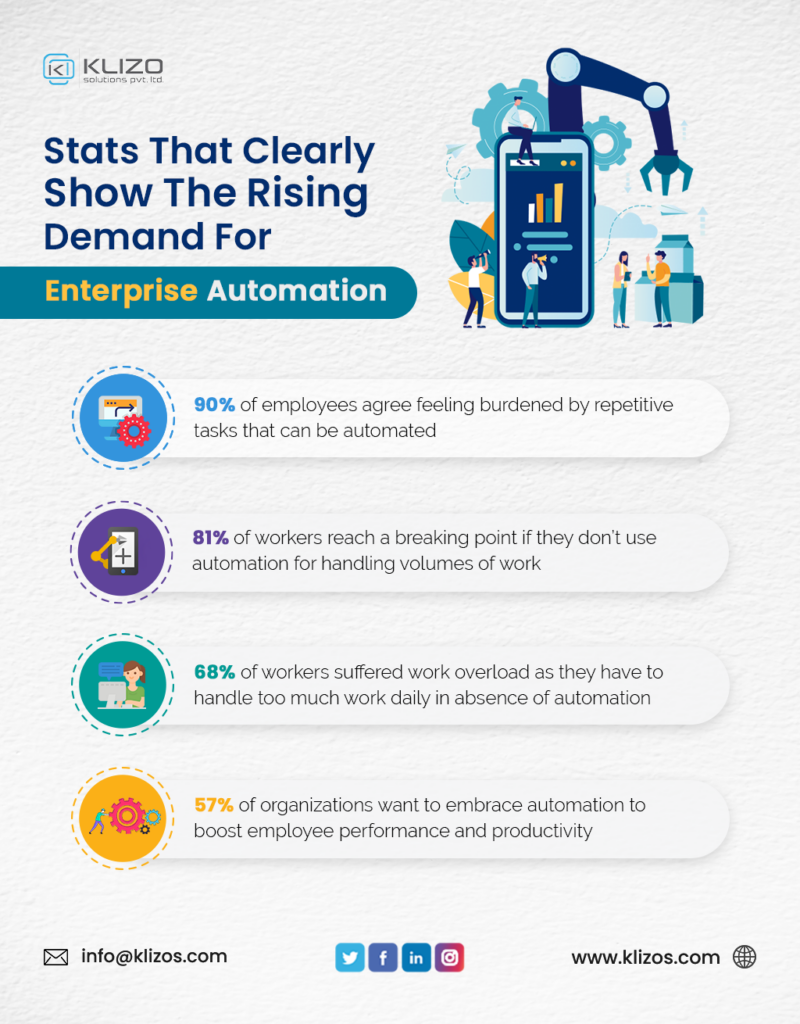


Every enterprise and every organization wants to grow! And as the business grows, the number of its employees and workers increases.
As a result, the usual back office management and business processes that used to be ordinary tasks start feeling like a burden. And that is where enterprise automation comes to your rescue!
Yes, taking care of the increasingly repetitive tasks demands an unacceptable amount of time and eventually takes a toll on the business processes. Especially in growing organizations with increased business demands, relying only on human capabilities prevents achieving effective and quick performance. Plus, tedious and repetitive work like collecting and entering data, processing transactions and reconciling records, etc., makes the employees unhappy and increases the risks of errors!
With automation solutions, however, such tasks can be done accurately, faster, and without requiring any breaks!
Have you not opted for automation adoption yet? Then, let us unlock the potential enterprise automation has to offer to your organization and know why you must adopt it ASAP.
Just as the name suggests, enterprise automation refers to the process of automating repetitive or rule-based manual tasks by using automation solutions. It streamlines repetitive and complicated manual processes and lets software, machines and robots carry out the tasks to achieve better results than humans.
Using a spreadsheet and completely automating business processes through a system of integrated applications like transaction processing, collecting and entering data, reconciling data, etc., are examples of enterprise automation.
Some examples of automation systems in enterprises are Customer Relationship Management (CRM) software, Professional Services Automation (PSA) software, Enterprise Resource Planning (ERP) software, etc.
As per market stats, enterprise automation is one of the crucial initiatives businesses take toward achieving digital transformation. Even a few decades ago, it was mainly the manufacturing industry where you could see the application of automation. But today, one can find automation in almost every department of an enterprise, from customer service to finance, marketing automation to sales, and more.

There are usually four different types of enterprise automation. And each type comes with certain levels of automation sophistication. Let us check out those in detail below:
This type of enterprise automation focuses on making certain tasks easier to perform and does not require user input. The automation of basic manual and repetitive tasks falls under this category.
Common examples of basic automation are dashboards for aggregating data collected from different sources, creating and assigning tasks, accounting for the time spent on a particular project or task, etc.
To be specific, automatically blocking any comment that uses any slang word or automatically forwarding personalized emails to every new signup are examples of basic automation at play.
This complex and more impactful automation type focuses on managing and documenting business processes. So that everyone involved in a task knows what is going on and how to carry out their tasks.
Also referred to as process automation, this is software that helps to streamline business processes. Examples of business process automation software are Power Automate, Nanonets, etc., which let teams better follow and keep a track of their processes.
Instead of relying on outdated methods, this type of automation allows teams to use automated software for documenting and sharing all the instructions and tasks related to the organizational strategy.
Here, software or robots carry out repetitive and high-volume tasks based on predetermined instructions and mimic human actions/regular cognitive human tasks. Functioning as a digital workforce, the RPA software performs rule-based tasks and does not require human intervention.
As per reports, 60% of all business processes can be completed by RPA robots which can free up the employees to focus on the other more valuable tasks and higher level thinking and eventually boost the organization’s productivity and ROI.
One of the most powerful types of enterprise automation, this technique integrates data, applications, and devices by creating one unified platform with automated workflows. Now, these workflows connect different hardware and software applications and make them share information and carry out tasks independently.
With the help of this type of automation, organizations can save both their time and money as the need for human input will be reduced. Plus, it can also ensure quality and consistency as the risks of human error will no longer be in the equation.

In the United States alone, organizations can automate 2.6 trillion work hours. Reports say that half of the work that people get paid to do can be automated!
If you are thinking about why automation is important in business, then here are the main advantages of implementing even the most basic level of automation in your organization!
No matter the domain, enterprise automation can boost the performance of the entire company. But how?
Automation solutions can identify underperforming areas and weak points that can be optimized for better results, faster and increased performance, and reduced costs.
Enterprise automation increases the efficiency of an organization’s internal processes and brings transparency to them. For example, compared to the time taken to perform operations involving manual labor, with automation, it can be completed way faster.
As per studies, 51% of the automation initiatives that companies took were to boost their employee efficiency. Plus, 70% of businesses believe that enterprise automation is crucial to create more effective teams.
If a human takes half a second to operate a task, automation can complete the same within hundredths of a second or even quicker than that. And if that is a repetitive task, software or bots can perform those 24/7 without getting tired.
The most basic automation solutions can boost the accuracy of the work in an organization. By reducing errors otherwise caused by humans, automation ensures there is no chance for mistakes.
After all, like humans, algorithms cannot get distracted or feel bored. So naturally, they don’t make mistakes with a button.
Since enterprise automation lets you get more things done in less time, it automatically helps to save money.
For example, when you use process automation software, you no longer need to invest in pricey equipment or hire as many employees, which can automatically reduce your overhead costs and boost profits.
Plus, using such systems also does not require the intervention of humans, which means no need for a human operator. More savings, no doubt!
The various enterprise automation software of today can help employees and workers to spend more time doing what they love.
By allowing them to pay more attention to those works that do not just require creativity but are impossible without human intervention, automation frees the employee from routine monotonous work and boosts their job satisfaction.
Plus, enterprise automation also helps to ensure proper workload distribution.
The term fault tolerance refers to a system’s ability to respond to a failure and continue performing without interruption despite the failure of one or more components.
Now automation helps to assess the operations of systems at various points and determine the chances of any failure in the future. By analyzing the sensor data, algorithms can predict a fault and the failure time and inform the workers in advance to ensure that the production line does not get disrupted in any way.
Had there not been the invention and adoption of the latest technologies, automation would not have seen the light of day! The use of various latest and innovative technologies is uplifting the automation industry.
So, let us take a quick look at some of the evolving technologies that are proving their worth and helping enterprises with automation.
We all know how AI understands and analyzes human behaviors and interacts with customers. This technology is used for automation to help businesses with decision-making, understanding, problem-solving, reasoning, and more.
Today, more and more organizations are opting for AI-based applications that come with speech recognition, expert systems, and machine vision. Its features like real-time problem solving, gathering insights from cloud-based data, improving user experience with chatbots, and offering business insights for better decision-making make this tech ideal for enterprise automation software.
Given the increasing cloud fever, it won’t be wrong to say that cloud computing is one of the most effective technologies today that is changing the face of a business positively and taking it to a whole new level.
The various cloud migration automation tools can deliver repeatable and reliable results across multiple environments and simplify and accelerate the migration process. Automation and cloud computing help to free up employee time to focus on tasks of higher value and reduce human error.

The comprehensive concept of IoT is a technology that makes your devices or products smarter and signifies an automated and connected environment in offices, homes, or industries. Using embedded systems, other technologies, and networks, IoT creates connected devices and helps with automation and secure and fast communications to a certain level.
From data-driven marketing to ensuring smarter operations, efficient processes, accurate and prompt customer service, real-time tracking and monitoring of devices, and data analytics, IoT helps businesses in various ways to embrace automation.
If you want to scale your business, enterprise automation is the tool you need right now. But then again, it’s no magic potion that will grow your business in an instant!
Embracing it sooner will help you begin your journey toward achieving complete digital transformation and driving maximum productivity and efficiency.
To automate your business processes and workflow, get in touch with us!
Apart from offering you various advanced tech solutions, we can help you identify where you can incorporate automation and make tech-based improvements. We are a specialized development company with years of experience in building technologies and taking businesses to the next level.
Let’s connect to find out how we can help you out!
Previous article
Joey Ricard
Klizo Solutions was founded by Joseph Ricard, a serial entrepreneur from America who has spent over ten years working in India, developing innovative tech solutions, building good teams, and admirable processes. And today, he has a team of over 50 super-talented people with him and various high-level technologies developed in multiple frameworks to his credit.

Subscribe to our newsletter to get the latest tech updates.